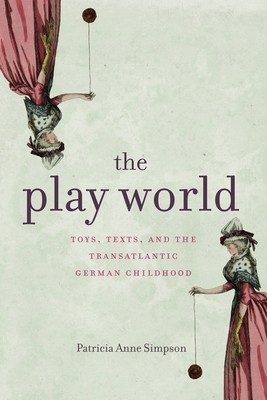
- We will send in 10–14 business days.
- Author: Patricia Anne Simpson
- Publisher: Penn State University Press
- ISBN-10: 0271087005
- ISBN-13: 9780271087009
- Format: 15.2 x 22.9 x 1.8 cm, minkšti viršeliai
- Language: English
- SAVE -10% with code: EXTRA
Reviews
Description
The Play World chronicles the history and evolution of the concept of play as a universal part of childhood. Examining texts and toys coming out of Europe between 1631 and 1914, Patricia Anne Simpson argues that German material, literary, and pedagogical cultures were central to the construction of the modern ideas and realities of play and childhood in the transatlantic world.
With attention to the details of toy manufacturing and marketing, Simpson considers prescriptive texts about how children should play, treat their possessions, and experience adventure in the scientific exploration of distant geographies. She illuminates the role of toys--among them a mechanical guillotine, yo-yos, hybridized dolls, and circus figures--as agents of history. Using an interdisciplinary approach that draws from postcolonial, childhood, and migration studies, she makes the case that these texts and toys transfer the world of play into a space in which model childhoods are imagined and enacted as German. With chapters on the Protestant play ethic, enlightened parenting, Goethe as an advocate of play, colonial fantasies, children's almanacs, ethnographic play, and an empire of toys, Simpson's argument follows a compelling path toward understanding the reproduction of religious, gendered, ethnic, racial, national, and imperial identities, emanating from German-speaking Europe, that collectively construct a global imaginary.
This foundational and deeply original study connects German-speaking communities across the Atlantic as they collectively engender the epistemology of the play world. It will be of particular interest to German studies scholars whose research crosses the Atlantic.
EXTRA 10 % discount with code: EXTRA
The promotion ends in 22d.13:41:25
The discount code is valid when purchasing from 10 €. Discounts do not stack.
- Author: Patricia Anne Simpson
- Publisher: Penn State University Press
- ISBN-10: 0271087005
- ISBN-13: 9780271087009
- Format: 15.2 x 22.9 x 1.8 cm, minkšti viršeliai
- Language: English English
The Play World chronicles the history and evolution of the concept of play as a universal part of childhood. Examining texts and toys coming out of Europe between 1631 and 1914, Patricia Anne Simpson argues that German material, literary, and pedagogical cultures were central to the construction of the modern ideas and realities of play and childhood in the transatlantic world.
With attention to the details of toy manufacturing and marketing, Simpson considers prescriptive texts about how children should play, treat their possessions, and experience adventure in the scientific exploration of distant geographies. She illuminates the role of toys--among them a mechanical guillotine, yo-yos, hybridized dolls, and circus figures--as agents of history. Using an interdisciplinary approach that draws from postcolonial, childhood, and migration studies, she makes the case that these texts and toys transfer the world of play into a space in which model childhoods are imagined and enacted as German. With chapters on the Protestant play ethic, enlightened parenting, Goethe as an advocate of play, colonial fantasies, children's almanacs, ethnographic play, and an empire of toys, Simpson's argument follows a compelling path toward understanding the reproduction of religious, gendered, ethnic, racial, national, and imperial identities, emanating from German-speaking Europe, that collectively construct a global imaginary.
This foundational and deeply original study connects German-speaking communities across the Atlantic as they collectively engender the epistemology of the play world. It will be of particular interest to German studies scholars whose research crosses the Atlantic.


Reviews